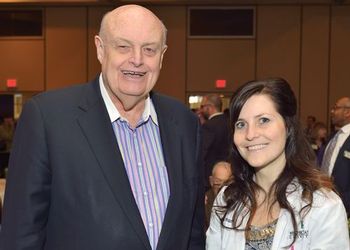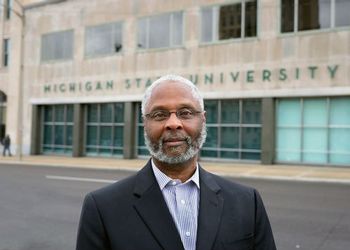A New Model for Public Health
C.S. Mott grant fuels Flint public health program expansion.
September 19, 2014
Efforts by the MSU College of Human Medicine to expand its public health program in downtown Flint got a boost with a $9 million grant from the Charles Stewart Mott Foundation. The program represents an important new model in public health research and education, with the potential to bring national distinction to Flint as a place looked to for solutions to some of the most challenging behavioral health issues in the United States.
The grant will create an endowment to expand the number of MSU third and fourth-year medical students in Flint and to provide stable funding that will enable the college to recruit top-caliber public health researchers. These researchers and their students will work to create solutions for health priorities identified by the community related to chronic disease and healthy behaviors.
“We want to help build a reputation for Flint as a wellspring of medical research that improves lives in mid-Michigan and beyond,” says Marsha D. Rappley, M.D., dean of the college. “That research component will build on the superb medical education and outstanding health care provided by Genesys, Hurley and McLaren. Our growing relationships with all of our partners will make Flint a healthier and more vibrant place.”
The College of Human Medicine launched its public health program and master’s in public health degree in 2008 on MSU’s main campus in East Lansing. MSU has had a longstanding relationship with the Flint area health care system, which has provided nearly 750 medical students from the college with clinical education and internships since the 1970s.
“Our growing partnership with the Mott Foundation is helping MSU do more of what we do best: bringing world-class research to bear on real-world problems,” says MSU President Lou Anna K. Simon. “We are committed to providing much-needed health services for the Flint region, and we’re excited about the new opportunities this expansion creates for our students.”
A number of community partners – including Hurley Medical Center, McLaren-Flint, Genesys Health System, Genesee County Health Department and the Greater Flint Health Coalition – have worked together in the last several years to help guide the development of the Flint program. The Charles Stewart Mott Foundation funded those efforts with a $2.81 million grant to MSU in 2011.
“MSU medical students have trained in Flint for many years, and the college has developed a strong working relationship with our local health care institutions,” says William S. White, president and CEO of the foundation. “This public health project adds an exciting new dimension to that work.”
Medical student Sarah Muszynski says she “can’t think of a better place for clinical training,” noting the integration of MSU’s School of Social Work and now public health will offer a unique perspective that will ultimately provide a more comprehensive model of care for the residents.
“From the preventative aspects of public health to delivering compassionate medical care and assuring appropriate follow up and accessibility to resources will ensure medical residents are advocates for patients at every level of the health care system,” she says.
The MSU College of Human Medicine Flint campus, which includes the public health program and space for researchers, will occupy about 40,000 square feet in the former Flint Journal building, owned by Uptown Reinvestment Corporation.
For more information on making a gift to the MSU College of Human Medicine, contact Senior Director of Development Susan Lane at lanes@msu.edu or call (616) 234-2614.




